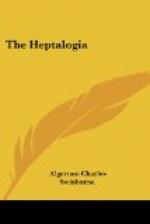snuggery,
And proposed a light supper by way of a finish. I treated her, Bill,
To six entrees of ortolans, sprats, maraschino, and oysters. It made
her quite ill.
Of which moment of sickness I took some advantage. I held her like this,
And availed myself, sir, of her sneezing, to shut up her lips with a kiss.
The waiters, I saw, were quite struck; and I felt, I may say, entre nous,
Like Don Juan, Lauzun, Almaviva, Lord Byron, and old Richelieu.
(You’ll observe, Bill, that rhyme’s quite Parisian; a Londoner, sir,
would have cited old Q.
People tell me the French in my verses recalls that of Jeames or John
Thomas: I
Must maintain it’s as good as the average accent of British diplomacy.)
These are moments that thrill the whole spirit with spasms that excite
and exalt.
I stood more than the peer of the great Casanova—you know—de Seingalt.
She was worth, sir, I say it without hesitation, two brace of her sisters.
Ah, why should all honey turn rhubarb—all cherries grow onions—all
kisses leave blisters?
Oh, and why should I ask myself questions? I’ve heard such before—once
or twice.
Ah, I can’t understand it—but, O, I imagine it strikes me as nice.
There’s a deity shapes us our ends, sir, rough-hew them, my boy, how
we will—
As I stated myself in a poem I published last year, you know, Bill—
Where I mentioned that that was the question—to be, or, by Jove, not
to be.
Ah, it’s something—you’ll think so hereafter—to wait on a poet like me.
Had I written no more than those verses on that Countess I used to
call Pussy—
Yes, Minette or Manon—and—you’ll hardly believe it—she said they
were all out of Musset.
Now I don’t say they weren’t—but what then? and I don’t say they
were—I’ll bet pounds against pennies on
The subject—I wish I may never die Laureate, if some of them weren’t
out of Tennyson.
And I think—I don’t like to be certain, with Death, so to speak, by
me, frowning—
But I think there were some—say a dozen, perhaps, or a score—out of
Browning.
And—though God knows his poems are not (as all mine are, sir) perfumed
with orris—
Or at least with patchouli—I wouldn’t be sworn there were none out of
Morris.
And it’s possible—only the legend of Circe is quite an old yarn—old
As the hills—that I might have been thinking, perhaps, of a poem by Arnold
When I sang how Ulysses—Odysseus I mean—would have yearned to dishevel
her
Bright hair with his kisses, and painted myself at her feet—a Strayed
Reveller.
As for poets who go on a contrary tack to what I go and you go—
You remember my lyrics translated—like “sweet bully Bottom”—from Hugo?
Though I will say it’s curious that simply on just that account there
And proposed a light supper by way of a finish. I treated her, Bill,
To six entrees of ortolans, sprats, maraschino, and oysters. It made
her quite ill.
Of which moment of sickness I took some advantage. I held her like this,
And availed myself, sir, of her sneezing, to shut up her lips with a kiss.
The waiters, I saw, were quite struck; and I felt, I may say, entre nous,
Like Don Juan, Lauzun, Almaviva, Lord Byron, and old Richelieu.
(You’ll observe, Bill, that rhyme’s quite Parisian; a Londoner, sir,
would have cited old Q.
People tell me the French in my verses recalls that of Jeames or John
Thomas: I
Must maintain it’s as good as the average accent of British diplomacy.)
These are moments that thrill the whole spirit with spasms that excite
and exalt.
I stood more than the peer of the great Casanova—you know—de Seingalt.
She was worth, sir, I say it without hesitation, two brace of her sisters.
Ah, why should all honey turn rhubarb—all cherries grow onions—all
kisses leave blisters?
Oh, and why should I ask myself questions? I’ve heard such before—once
or twice.
Ah, I can’t understand it—but, O, I imagine it strikes me as nice.
There’s a deity shapes us our ends, sir, rough-hew them, my boy, how
we will—
As I stated myself in a poem I published last year, you know, Bill—
Where I mentioned that that was the question—to be, or, by Jove, not
to be.
Ah, it’s something—you’ll think so hereafter—to wait on a poet like me.
Had I written no more than those verses on that Countess I used to
call Pussy—
Yes, Minette or Manon—and—you’ll hardly believe it—she said they
were all out of Musset.
Now I don’t say they weren’t—but what then? and I don’t say they
were—I’ll bet pounds against pennies on
The subject—I wish I may never die Laureate, if some of them weren’t
out of Tennyson.
And I think—I don’t like to be certain, with Death, so to speak, by
me, frowning—
But I think there were some—say a dozen, perhaps, or a score—out of
Browning.
And—though God knows his poems are not (as all mine are, sir) perfumed
with orris—
Or at least with patchouli—I wouldn’t be sworn there were none out of
Morris.
And it’s possible—only the legend of Circe is quite an old yarn—old
As the hills—that I might have been thinking, perhaps, of a poem by Arnold
When I sang how Ulysses—Odysseus I mean—would have yearned to dishevel
her
Bright hair with his kisses, and painted myself at her feet—a Strayed
Reveller.
As for poets who go on a contrary tack to what I go and you go—
You remember my lyrics translated—like “sweet bully Bottom”—from Hugo?
Though I will say it’s curious that simply on just that account there




